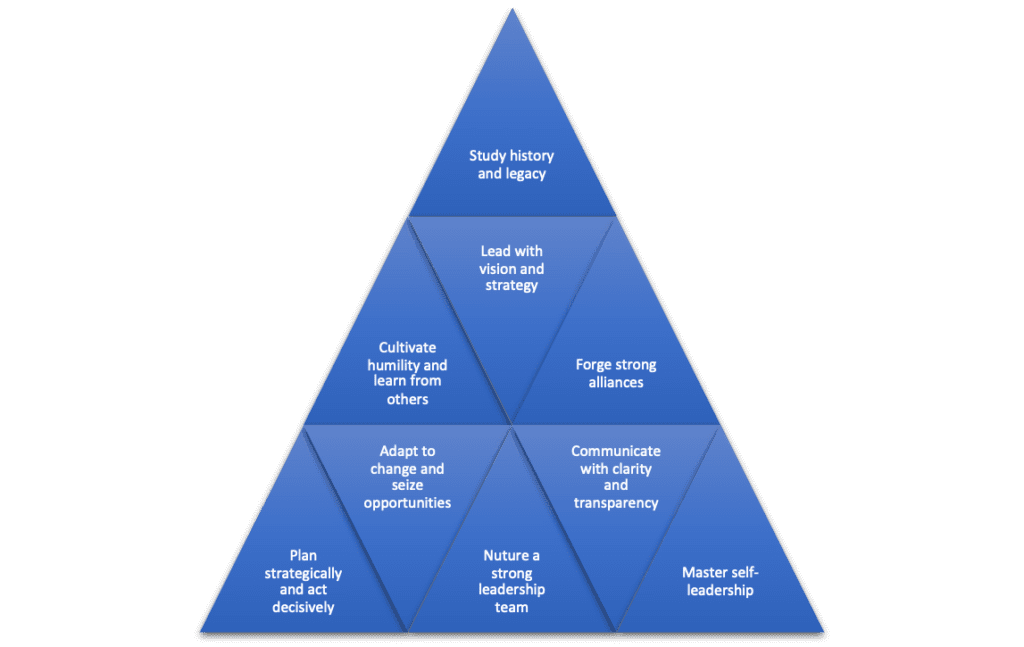THINK LIKE A LEADER:
PART 2 OF 4: THE SUCCESSOR LEADER
In the realm of strategy and leadership, few texts are as timeless and influential as Sun Tzu’s “The Art of War.” This powerful ‘Art of Words’ can assist leaders, and those in line to become leaders, of family businesses. In this four part series, we explore how the principles in the Art of War can be applied to four main players when it comes to succession within a family-owned business. This article describes the second player – the successor leader.
As the heir and successor to a family business, the weight of the company’s legacy rests on your shoulders. To effectively lead and sustain the business, consider embracing the principles of Sun Tzu’s “The Art of War.” This ancient treatise provides invaluable insights into strategic leadership that can help navigate the complexities of a family-owned enterprise and ensure its continued success. In this article, we will explore how the principles espoused in Sun Tzu’s teachings can guide and empower the successor leader in their journey towards effective leadership and long-term success. It is summarised in Fig 1: The Successor’s Triangle Strategy.
Fig 1: The Successor’s Triangle Strategy
Study the History and Legacy
Sun Tzu advises that before entering any endeavour, one must study its history and past conflicts to gain insights into strategy and tactics. As the future leader of a family business, delve deeply into its history, values, and past challenges. Understanding the triumphs and struggles of previous generations and the organisation’s history, culture, successes, and failures will enable you to draw upon wisdom, avoid repeating past mistakes and provides a valuable foundation for making informed decisions. Appreciating the company’s legacy will also instil a sense of pride and commitment to preserving its heritage.
2. Cultivate Humility and Learn from Others to build Alliances
In “The Art of War,” humility is praised as a virtue for a successful leader. As the successor, acknowledge that there is much to learn from others, including experienced family members, employees, and external advisors. Embrace a mindset of continuous learning and remain open to feedback and diverse perspectives. Remember, true strength lies in the ability to recognise and build upon the strengths of those around you.
3. Lead with Vision and Strategy
Sun Tzu stresses the significance of strategic thinking and planning. The successor must have a clear vision for the family business’s future and develop a comprehensive strategy to achieve it. By analysing the competitive landscape, identifying opportunities, and anticipating challenges, the successor can create a roadmap for success. Effective communication of this vision and strategy will inspire and align the entire organisation towards shared goals.
The heart of these teachings lies in strategic planning and decisive action. Remember, a well-thought-out plan is only valuable when accompanied by swift and resolute action. Be confident in your decisions and lead with conviction.
4. Forge Strong Alliances
Sun Tzu stresses the importance of strong alliances, and within a family business, this takes on added significance. Nurture relationships with family members involved in the company, building trust and understanding among one another. Establish clear lines of communication and collaborate on decision-making processes. Unite the family’s diverse talents and perspectives to form a cohesive team with a shared vision.
Develop relationships with mentors, industry leaders, and experts who can offer guidance and support during the transition. Collaborative alliances and networks can provide insights, diverse perspectives, and a robust support system for the successor leader.
5. Plan Strategically and Act Decisively
The heart of Sun Tzu’s teachings lies in strategic planning and decisive action. As the successor leader, develop a clear vision for the future of the family business. Identify potential challenges and opportunities in the market and create a comprehensive strategic plan. But remember, a well-thought-out plan is only valuable when accompanied by swift and resolute action. Be confident in your decisions and lead with conviction.
6. Adapting to Change and Seizing Opportunities
Sun Tzu recognised the importance of adaptability in the face of change. The successor must embrace innovation, anticipate market trends, and proactively identify new opportunities. Agility and flexibility enable the family business to remain competitive and relevant in a dynamic marketplace. The successor should encourage a culture that embraces change and fosters creativity, empowering employees to contribute ideas and drive innovation.
7. Nurture a Strong Leadership Team
According to Sun Tzu, a successful leader must cultivate a strong team. The successor should focus on developing a leadership team that complements their own skills and strengths. Identify individuals with diverse expertise, promote talent from within the organisation, and recruit external professionals when necessary. Invest in their growth and provide opportunities for training and development. A capable and cohesive leadership team will strengthen the family business and ensure its continued success.
8. Communicate with Clarity and Transparency
Effective communication is vital for any leader, particularly in a family business. Be transparent with family members and employees about the company’s goals, challenges, and progress. Encourage open dialogue and active listening to foster a culture of trust and collaboration. By maintaining clear and honest communication, you can minimise misunderstandings and build a united and motivated team.
9. Master Self-Leadership
Before assuming the leadership role, it is essential for the successor to master self-leadership. Sun Tzu emphasises the importance of knowing oneself. The successor must possess self-awareness, understanding their strengths, weaknesses, and areas for development.
This introspection allows for the identification of personal growth opportunities and the ability to lead with authenticity and confidence. By leading oneself effectively, the successor can inspire trust and respect from the family and the entire organisation.
Conclusion
The principles espoused in Sun Tzu’s “The Art of War” offer valuable guidance to the successor leader in a family business. A successor can navigate the challenges of leadership succession and steer the family business towards sustainable growth and prosperity. Embrace these timeless principles, and forge a path of success while honouring the legacy while charting a path to a prosperous future.

